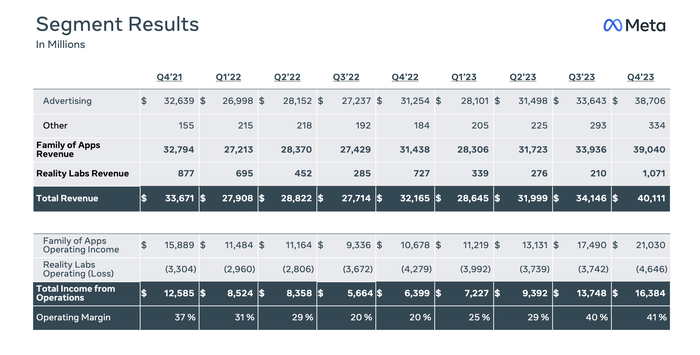Trending
Opinion: How will Project 2025 impact game developers?
The Heritage Foundation's manifesto for the possible next administration could do great harm to many, including large portions of the game development community.
Reality Labs continues to lose billions each quarter, and Meta now expects those losses to "increase meaningfully year-over year."

Reality Labs lost $16.1 billion during the 2023 fiscal year in an attempt to realize the metaverse ambitions of parent company Meta.
That represents a significant increase on the $13.7 billion loss the division recorded across FY22, and Meta expects those losses to "increase meaningfully year-over year" due to its product development efforts in AR and VR.
Reality Labs houses Meta's augmented and virtual reality related consumer hardware, software, and content, including the hardware maker formerly known as Oculus.
Despite laying off over 20,000 workers in 2022 and 2023—including some within Reality Labs—the Facebook owner continues to invest heavily in the division as part of its big bet on the metaverse and spatial computing.
Meta attempted to soften those losses by revealing Reality Labs crossed $1 billion in revenue during Q4 for the first time, and claimed its Quest platform had a "strong holiday season."
"Quest 3 is off to a strong start and I expect it to continue to be the most popular mixed reality device. With Quest 3 and Quest 2 both performing well, we saw the Quest app was actually the most downloaded app in the app store on Christmas Day," said Meta CEO Mark Zuckerberg during an earnings call.
Reality Labs, however, also recorded losses of $4.6 billion during that bumper fourth quarter. As the table below shows, that's the biggest quarterly loss the division has reported in the past two years.

Discussing the future of the division in the face of those losses, Zuckerberg said the company will continue making "significant investments" in both Reality Labs and AI, and claims the two technologies can develop "hand-in-hand."
"If you take smart glasses, before, we thought that we would have to build like full displays and holograms and deliver the sense of presence before that became a mainstream product. And now it seems quite possible that smart glasses that have AI assistants built in will be the killer app, and that the holograms and sense of presence will come later—maybe on the same time horizon we were talking about before but could end up being just as important as we expected," said Zuckerberg.
"But there could be a big market here even before that. So I think we'll figure that out over the next few years. But yes, I mean, overall, I think the two go together pretty hand-in-hand. I would have predicted that a lot of the parts of Reality Labs—I guess the sequence in technology is sometimes surprising."
Meta CFO Susan Li added that Meta hopes to realize a "breadth" of ambitions with its current and next generation VR, MR, and AR devices alongside its metaverse social platforms, and must therefore invest heavily across a "very broad portfolio."
"We really are just investing in... both a very broad portfolio and then within each of those areas I would say that there's a lot of, for example, fundamental research that we are invested in, in order to help solve a lot of the physics challenges we're going to have creating devices that are comfortable enough for you to wear everyday and have the computational power that would be required for them to also be a meaningful addition to your experience," said Li.
"So these are really, I would say, very ambitious investments. They are intended to build the next computing platform. We haven't given any specifics on the outlook beyond 2024 but it's an area of long term and ambitious vision for us and we'll continue investing against that vision."
Read more about:
Top StoriesYou May Also Like